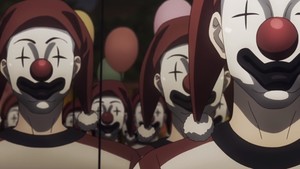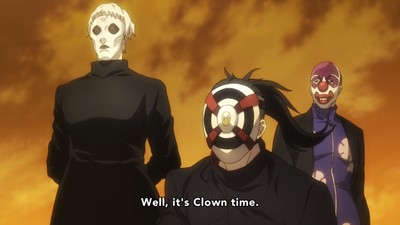Tokyo Ghoul:re
Episode 18
by Sylvia Jones,
How would you rate episode 18 of
Tokyo Ghoul:re (TV 2) ?
Community score: 4.4
 Send in the Clowns. I made an offhand joke about this in a prior This Week In Anime column, but it's no secret that Sui Ishida has been all about the clown aesthetic throughout Tokyo Ghoul's run. If you really wanted to, you could draw out some thematic resonance from this: the masks that ghouls wear literally and figuratively, the performances that Kaneki especially has to put on as he straddles two worlds, etc. As Tokyo Ghoul draws closer to the end, however, it appears that this was moreso foreshadowing the ultimate enemy Kaneki and his allies will have to face. I would criticize the absurdity of our hero's greatest foe being a bunch of fascist clowns if it weren't such a painfully accurate reflection of modern times.
Send in the Clowns. I made an offhand joke about this in a prior This Week In Anime column, but it's no secret that Sui Ishida has been all about the clown aesthetic throughout Tokyo Ghoul's run. If you really wanted to, you could draw out some thematic resonance from this: the masks that ghouls wear literally and figuratively, the performances that Kaneki especially has to put on as he straddles two worlds, etc. As Tokyo Ghoul draws closer to the end, however, it appears that this was moreso foreshadowing the ultimate enemy Kaneki and his allies will have to face. I would criticize the absurdity of our hero's greatest foe being a bunch of fascist clowns if it weren't such a painfully accurate reflection of modern times.
While the previous episode focused on Kaneki and the struggles of piecing together a peaceful alliance of ghouls and humans, this episode is about the ease with which the entire CCG falls in line with Furuta's nefarious intentions. In fact it's almost laughable how easily Furuta is able to manipulate everyone. The manga probably goes more into the nuts and bolts of his ascension, but I'd like to read this disparity between Furuta's and Kaneki's narratives as a commentary on the nature of the CCG itself. Any military or paramilitary organization can ostensibly function on the best intentions, but in the end it can still be employed for pretty much any reason. In theory, the CCG is there to protect humans and stop ghouls, but in practice, it's there to do whatever the person in charge wants, even if that includes the wanton slaughtering of humans. Furuta and the Clowns' dirty trick naturally gives many investigators pause, and Ui even correctly asserts that this should be the end of the CCG. But it's not the end. The CCG is too large and powerful to answer to a public outcry, and Furuta deftly spins the horror of their actions into a rallying cry of revenge against the Clowns. Of course, we know that Furuta is in cahoots with the Clowns, and together they're manipulating all of this, but that doesn't matter. This is both the CCG being duped and the CCG functioning as intended, and the result will only be more bloodshed.
It isn't just the concentration of warriors and weapons that makes the CCG such a powderkeg—it's also a ridiculously high concentration of daddy issues. I've already talked about how paternal/maternal trauma is one of Tokyo Ghoul's pet themes, but this episode really hones in on just how many of these investigators are dealing with abandonment and dealing with it poorly. Again, it makes sense given the risk that comes with being an investigator, with death upon death rippling, resonating, and crashing through friends and family members. Many join the CCG in the hopes of avenging their loved ones, only to propagate this cycle of death and revenge even further. Juzo, for instance, owes his new lease on life to Shinohara's kindness. Shinohara is one of Tokyo Ghoul's rare examples of a genuinely good father figure, but his bond with Juzo grew in the context of the CCG, so in his comatose absence, the CCG is all Juzo has. Meanwhile, Ui ruminates on all of the people he's lost recently, including his former mentor Arima. This is a familiar scene we've seen from multiple characters, and it's dominated not by sadness but a hollow sense of inevitability. Mutsuki's trauma also wraps itself around his feelings for Kaneki, twisting them into resentment that the man he loved—maybe as a father, maybe as a partner—did not save him and isn't strong enough to help him.
Urie is quite possibly Tokyo Ghoul:re's poster child for abandonment issues. He's kept it no secret that his reason for joining the CCG was his late father, and this has also informed his ambition and the way he treats his fellow investigators. That veneer gets peeled back this week as he faces off against the recently-freed Donato Porpora, who despite the lack of a glass prison wall, continues to do his best Hannibal Lecter impersonation. He playfully dodges all of Urie's attacks while he pries open his psyche to reveal the deep-seated anger simmering beneath his feelings about his father. He resents his father for leaving him all alone as a child; the circumstances of his death don't matter. Urie doesn't just want to be stronger—he wants specifically to be stronger than his father, and since his father helped capture Donato once, losing against him now is not an option. So Urie “frames out” (Quinx jargon for going berserk), consumed by his resentment for his father's weakness. In line with what we've come to expect from Tokyo Ghoul, however, he's saved not by some distant and powerful parental figure, but by the friends and partners who choose to stand by him. His own family might have created these problems, but it's the family he made for himself among the Quinxes who can help resolve these problems. Way to go, Saiko!
Like the previous episode, I enjoyed the more psychological focus of this installment, which gave me some good things to think and talk about. It still bears repeating that Tokyo Ghoul:re remains a big ol' mess. Probably the most frustrating plot-related thing right now is that I have absolutely no clue why Furuta is doing anything he's doing. Obviously he's pulling a lot of strings behind the scenes, but to what end? I know the revelation will come eventually, but it's hard to care about him as a villain when the only motivating factor appears to be evil for the sake of it. I'm also not a fan of Ishida turning Mutsuki into his latest whipping boy, especially when he's gotten so little screentime in the anime this season. And I doubly do not trust Ishida to tackle Mutsuki's gender issues in an appropriately sensitive fashion. If there's any saving grace, it's that Tokyo Ghoul:re has so many spinning plates and so little time left that it probably won't have the real estate to commit to any one character arc or subplot getting too awful. Hopefully. I do have to say that Urie's confrontation with Donato and subsequent frame out actually felt creepy and menacing. The animation quality is still not great, but both that and the mise-en-scène were a cut above the rest of the show.
While this episode had its moments, there's only so much clown-centric violence I can watch before I have to hold my head in my hands and accept that this truly is the Most Tokyo Ghoul. Our team of heroes and anti-heroes are up against an army of clown suicide bombers. This is where we've gone. If you want a letter grade, I'd give this episode about a B-, but if you want my real rating, please read the screenshot below in an appropriately exasperated tone.
Rating:

Tokyo Ghoul:re is currently streaming on Funimation and Hulu.
Steve is an anime-reviewing zombie who can be found making bad posts about anime on Twitter.
The views and opinions expressed in this article are solely those of the author(s) and do not necessarily represent the views of Anime News Network, its employees, owners, or sponsors.
discuss this in the forum (41 posts) |
back to Tokyo Ghoul:re
Episode Review homepage / archives